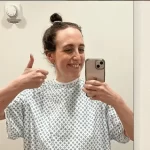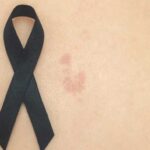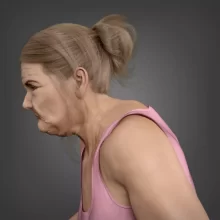Mother Diagnosed With Late Stage Blood Cancer After Putting Symptoms Down to Early Menopause
The post Mother Diagnosed With Late Stage Blood Cancer After Putting Symptoms Down to Early Menopause appeared first on Healthy Holistic Living.
Susete Isabel’s transformative journey, initially dismissing symptoms as menopause-related before confronting a late-stage blood cancer diagnosis, resonates deeply as a testament to the intricacies of the human experience. Furthermore, in her narrative, we find a compelling narrative arc that underscores the critical importance of attuning oneself to bodily signals and advocating for timely medical intervention.
This article begins by embarking on an immersive exploration of Susete’s remarkable odyssey, firstly delving into her initial misinterpretation of symptoms, then examining the profound impact of her diagnosis, followed by insights into lymphoma, treatment modalities, and prognostic considerations. Subsequently, it highlights her unwavering advocacy endeavors post-diagnosis, and finally discusses the broader societal reverberations of her story in elevating cancer awareness and fostering proactive healthcare practices.
Susete Isabel’s Experience: Misinterpretation and Diagnosis
Susete Isabel’s journey began with seemingly innocuous symptoms that could easily be dismissed as common occurrences during the menopausal transition. Night sweats, fatigue, and fluctuations in weight subtly encroached upon her daily life, initially brushed off as routine hormonal fluctuations typical of her age.
However, as time passed, these symptoms burgeoned in intensity, accompanied by new and alarming manifestations, including abdominal swelling and debilitating rib pain. Sensing an unsettling shift in her body’s equilibrium, Susete’s intuitive instincts urged her to seek urgent medical evaluation, overriding any lingering doubts or hesitations.
The cataclysmic revelation of a stage four lymphoma diagnosis shattered Susete’s previously held assumptions, plunging her into an abyss of medical complexity and emotional turmoil. The stark disparity between her initial attributions and the stark reality of her diagnosis underscored the capricious nature of health and the imperative of vigilance in confronting potential health concerns. In the wake of this seismic revelation, Susete navigated an uncharted terrain of medical exigency with fortitude and resilience, confronting the inherent uncertainties with unwavering determination.
Her journey serves as a poignant testament to the transformative power of self-awareness and proactive healthcare engagement, illustrating the profound implications of listening to one’s body and advocating for timely medical intervention. Through her narrative, Susete emerges as a beacon of resilience and empowerment, inspiring others to confront adversity with courage and tenacity.
The Importance of Listening to Your Body
Susete’s narrative strikingly resonates as a poignant testament to the intrinsic wisdom encoded within the subtle signals of the human body, effectively serving as an impassioned plea to heed these whispers with unwavering attentiveness. Moreover, within the nuanced cadences of bodily cues lies the potential for preemptive intervention, offering a lifeline amidst the tumultuous currents of uncertainty and adversity. Consequently, through her advocacy endeavors, Susete fervently implores individuals to cultivate a profound symbiosis with their corporeal selves, ultimately transcending the veil of complacency to embrace a proactive stance towards health and well-being.
Her clarion call to action resounds with a resolute urgency, challenging societal norms of stoic endurance and passive acceptance in the face of bodily discord. Susete’s unwavering conviction underscores the transformative potency of early detection in the realm of cancer management, elucidating the pivotal role of proactive healthcare engagement in averting potential adversities and enhancing treatment outcomes. Expert insights corroborate this imperative, elucidating the symbiotic interplay between timely intervention and augmented quality of life, imbuing hope amidst the shadows of uncertainty.
In a world fraught with distractions and discord, Susete’s narrative emerges as a beacon of clarity and empowerment, illuminating a path towards heightened self-awareness and holistic well-being. Through her impassioned advocacy, she ignites a collective awakening, galvanizing individuals to reclaim agency over their health trajectories and to embrace a culture of resilience and vigilance. In the tapestry of human existence, Susete’s voice reverberates as a steadfast reminder of the profound significance of listening to the sacred whispers of one’s body, forging a legacy of empowerment and enlightenment for generations to come.
Understanding Lymphoma: Types, Symptoms, and Prevalence
A comprehensive grasp of lymphoma, encompassing its diverse subtypes, intricate symptomatology, and prevalence patterns, serves as a cornerstone in understanding Susete’s diagnosis and navigating the expansive terrain of oncological disorders.
By immersing in prevalence data, discerning epidemiological trends, and dissecting clinical manifestations, readers embark on a journey of enlightenment, gaining profound insights into the pervasive impact of lymphoma and the pivotal role of early detection in ameliorating its toll.
Furthermore, elucidating the subtle differentiations between Hodgkin and non-Hodgkin lymphoma lays a robust foundation for contextualizing Susete’s diagnostic trajectory within the broader spectrum of lymphoid malignancies.
Types of Lymphoma
Hodgkin Lymphoma (HL): Distinguished by the presence of Reed-Sternberg cells, Hodgkin lymphoma emerges as a distinctive entity, albeit constituting a minority of lymphoma cases. This malignancy often unveils its presence through painless, palpable lymph node enlargements, predominantly localized in the cervical, axillary, or inguinal regions. While Hodgkin lymphoma may afflict individuals across various age groups, it predominantly afflicts young adults aged 15 to 35 and older adults over 55, embodying a unique demographic distribution within the lymphoma landscape.
Non-Hodgkin Lymphoma (NHL): Embracing a diverse panoply of subtypes, non-Hodgkin lymphoma emerges as the predominant entity within the lymphoma spectrum, presenting a myriad of clinical and histological variations. From indolent variants characterized by languid disease progression to aggressive subtypes heralded by rapid tumor dissemination, NHL showcases the heterogeneity inherent to lymphoid malignancies, necessitating tailored diagnostic and therapeutic approaches.
Symptoms of Lymphoma
Swollen Lymph Nodes: The quintessential harbinger of lymphoma, palpable lymph node enlargements serve as cardinal manifestations, often evoking concern and prompting clinical evaluation. Typically painless and rubbery in consistency, these nodal swellings signal potential lymphoma involvement, mandating diligent scrutiny and expeditious intervention.
B Symptoms: A constellation of systemic symptoms, colloquially termed B symptoms, emerges as a hallmark of lymphoma progression, encompassing fever, night sweats, and unexplained weight loss. These constitutional manifestations, though nonspecific, herald the systemic impact of lymphoma and herald advanced disease stages, warranting comprehensive diagnostic assessment.
Other Manifestations: Beyond lymphadenopathy and systemic symptoms, lymphoma may unveil a spectrum of ancillary manifestations, including fatigue, persistent cough, dyspnea, pruritus, abdominal discomfort, chest pain, and skeletal pain. The heterogeneity of lymphoma presentation underscores the diagnostic challenges posed, necessitating a holistic approach to symptom evaluation and differential diagnosis.
Prevalence of Lymphoma in a Global Scale
Within the United States, lymphoma emerges as a formidable public health concern, with an estimated 85,000 new cases diagnosed annually. Non-Hodgkin lymphoma prevails as the predominant entity, constituting approximately 90% of lymphoma diagnoses, while Hodgkin lymphoma accounts for the remaining 10%.
Globally, lymphoma ranks among the top ten most prevalent cancers, exhibiting variable incidence rates across geographic regions. While North America and Europe register higher lymphoma burdens, the disease permeates diverse populations worldwide, transcending borders and demographics.
Despite strides in diagnostic modalities and therapeutic innovations, lymphoma endures as a formidable adversary, necessitating sustained research endeavors and concerted public health initiatives to mitigate its impact and optimize patient outcomes. Through collaborative efforts and unwavering determination, the quest to conquer lymphoma persists, fostering hope and resilience in the face of adversity.
Insight into Follicular Lymphoma: Treatment and Prognosis
Susete Isabel’s journey through follicular lymphoma, a subtype of non-Hodgkin lymphoma distinguished by its slow-growing nature, invites a comprehensive exploration of treatment modalities and prognostic considerations. This multifaceted examination delves deeper into the array of therapeutic options available to patients like Susete, elucidating the evolving landscape of follicular lymphoma management and the pivotal role of prognostic factors in shaping treatment decisions and outcomes.
Treatment Modalities
Chemotherapy: A cornerstone of follicular lymphoma treatment, chemotherapy remains a primary therapeutic modality aimed at inducing remission and prolonging progression-free survival. Susete likely underwent chemotherapy regimens tailored to her disease stage and overall health, which may have included combinations of cytotoxic agents such as cyclophosphamide, doxorubicin, vincristine, and prednisone (CHOP) or rituximab in combination with chemotherapy (R-CHOP).
Immunotherapy: The advent of immunotherapy has heralded a paradigm shift in follicular lymphoma treatment, offering targeted interventions that harness the body’s immune system to recognize and eliminate cancer cells. Monoclonal antibodies such as rituximab, which specifically target CD20 antigens expressed on B-cell lymphoma cells, have become integral components of frontline and maintenance therapy regimens for follicular lymphoma patients.
Targeted Therapies: In recent years, the emergence of targeted therapies has revolutionized the management of follicular lymphoma, providing more precise and less toxic treatment options. Agents such as lenalidomide, a thalidomide derivative with immunomodulatory and antiangiogenic properties, and idelalisib, a phosphoinositide 3-kinase (PI3K) inhibitor, have shown efficacy in relapsed or refractory disease settings, offering new avenues for patients like Susete who may have exhausted standard treatment options.
Prognostic Considerations
Prognostication in follicular lymphoma hinges on accurate disease staging and grading, which inform treatment planning and prognostic stratification. Susete’s medical team likely conducted thorough evaluations, including imaging studies and bone marrow biopsies, to assess the extent of disease involvement and determine appropriate therapeutic strategies.
Molecular profiling and genetic analyses play a crucial role in refining prognostic assessments and guiding treatment decisions in follicular lymphoma. Susete’s tumor may have undergone genetic testing to identify specific mutations or chromosomal aberrations, such as t(14;18) translocations involving the BCL2 gene, which are associated with poorer prognosis and may influence therapeutic approaches.
Monitoring treatment response serves as a critical prognostic indicator in follicular lymphoma management, allowing clinicians to assess disease dynamics and adjust therapeutic strategies accordingly. Susete likely underwent regular assessments, including imaging scans and blood tests, to evaluate the efficacy of her treatment regimen and detect any signs of disease progression or relapse.
Psychosocial Dimensions of Cancer Care
The psychosocial dimensions of cancer care are crucial for supporting patients like Susete throughout their treatment journey. Specifically, collaborative care teams, comprising oncologists, nurses, social workers, and mental health professionals, offer comprehensive support and guidance to address the emotional, social, and practical challenges of living with cancer.
Additionally, hearing from fellow survivors can provide invaluable inspiration and encouragement to individuals navigating the complexities of cancer treatment. Susete may have connected with other follicular lymphoma survivors through support groups, online communities, or peer mentorship programs, finding solace and solidarity in shared experiences of resilience and hope.
Furthermore, Susete’s journey through follicular lymphoma exemplifies the dynamic interplay between medical advancements, personalized treatment approaches, and holistic patient care. By embracing innovative therapies, leveraging prognostic insights, and accessing robust psychosocial support networks, she embodies resilience and determination in the face of adversity, forging a path towards healing and empowerment in the realm of cancer survivorship.
Life After Diagnosis: Advocacy and Awareness
In the wake of her diagnosis, Susete Isabel emerges as a beacon of resilience and advocacy, harnessing the transformative potential of social media platforms to amplify cancer awareness and foster a culture of proactive healthcare engagement.
Moreover, through poignant narratives, compelling testimonials, and grassroots initiatives, Susete galvanizes a global community of allies in the fight against cancer, propelling a paradigm shift from passive acceptance to proactive empowerment. Her advocacy resonates as a clarion call to action, inspiring individuals to reclaim agency over their health trajectories and to champion a culture of resilience and solidarity.
Additionally, through her unwavering commitment to raising awareness and advocating for early detection and intervention, Susete not only empowers individuals to prioritize their health but also challenges societal norms and perceptions surrounding cancer. By sharing her journey and amplifying the voices of survivors and caregivers, she cultivates a sense of solidarity and hope, fostering a supportive ecosystem where individuals affected by cancer can find solace, support, and strength.
Susete’s advocacy extends beyond the confines of her own experience, transcending geographic boundaries and cultural barriers to ignite a global movement towards a future where cancer is met with courage, compassion, and collective action. In the face of adversity, she embodies resilience, determination, and unwavering optimism, inspiring countless others to embrace life with renewed vigor and purpose.
Susete Isabel’s Journey from Misdiagnosis to Championing Cancer Awareness
Susete Isabel’s journey from misunderstanding menopausal symptoms to confronting a dire lymphoma diagnosis underscores the profound importance of self-awareness and proactive health engagement. Her story serves as a crucial narrative in understanding the subtleties of body signals and the necessity for timely medical responses, particularly in cases masked by common symptoms of life stages. Through her personal ordeal, Susete not only navigated her path through the complexities of cancer treatment but also transformed her experience into a powerful advocacy platform, emphasizing the critical need for early detection and informed healthcare choices.
Emboldened by her experience, Susete has become a vocal advocate for cancer awareness, leveraging her story to educate others about the nuances of lymphoma and the broader implications of ignoring body signals. Her efforts to demystify cancer and promote a proactive approach to health are not only reshaping how people perceive their medical symptoms but are also inspiring a cultural shift towards more vigilant and responsive healthcare practices. As her narrative continues to influence and motivate, it stands as a beacon of hope and a call to action, reminding us all of the resilience of the human spirit and the transformative power of informed advocacy in the face of life’s most daunting challenges.
The post Mother Diagnosed With Late Stage Blood Cancer After Putting Symptoms Down to Early Menopause appeared first on Healthy Holistic Living.












